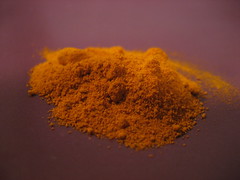“Finding ways to prevent stroke and identify people at risk for stroke are important public health problems,” said study author Abraham J. Letter of the University of Alabama at Birmingham. “This study shows we might get a better idea of who is at high risk of stroke by including a couple simple tests when we are evaluating people who already have some stroke risk.” [continue reading…]
Stroke
 Whether or not you’re fond of Indian, Southeast Asian and Middle Eastern food, stroke researchers at Cedars-Sinai Medical Center think you may become a fan of one of their key spices.
Whether or not you’re fond of Indian, Southeast Asian and Middle Eastern food, stroke researchers at Cedars-Sinai Medical Center think you may become a fan of one of their key spices.
The scientists created a new molecule from curcumin, a chemical component of the golden-colored spice turmeric, and found in laboratory experiments that it affects mechanisms that protect and help regenerate brain cells after stroke. Research scientist Paul A. Lapchak, Ph.D., director of Translational Research in the Department of Neurology at Cedars-Sinai Medical Center, will present these findings at the American Heart Association International Stroke Conference in Los Angeles on Wednesday, Feb. 9, at 6:15 p.m. PST. [continue reading…]

Image Credit: iStockphoto
People who experience memory loss or a decline in their thinking abilities may be at higher risk of stroke, regardless of whether they have been diagnosed with dementia, according to a new study published in the February 2, 2010, print issue of Neurology®, the medical journal of the American Academy of Neurology. [continue reading…]
Patients who received the antidepressant escitalopram following a stroke appeared to recover more of their thinking, learning and memory skills than those taking placebo or participating in problem-solving therapy, according to a report in the February issue of Archives of General Psychiatry, one of the JAMA/Archives journals. [continue reading…]

